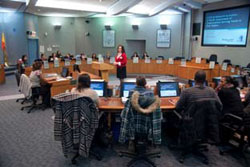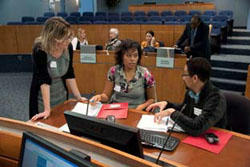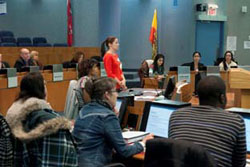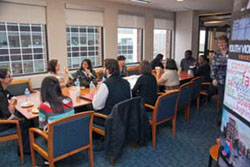
--
22/08/2013

02/01/2013

01/12/2012
Background Information:
Western University researchers partnered with the Region of Peel, Ontario to evaluate the capacity of community-based organizations (CBOs) serving youth to acquire, assess, adapt and apply research evidence. This assessment is the first step in a Knowledge Translation and Exchange (KTE) project designed to support CBOs to effectively link research evidence to action and make evidence-informed decisions, with the end goal of achieving the highest quality youth violence prevention service delivery.
Methods:
We used a multi-method approach to identify baseline capacity and needs: 1) 35 Peel CBOs completed a survey and 2) 14 organizations were represented at focus groups focused on sources of evidence used and barriers/facilitators of using research evidence.
Results:
CBOs generally felt confident in their ability to acquire research evidence from a variety of sources. Although some CBOs reported confidence in staff's ability to assess research, others require support. Few CBOs had neither staff nor external experts to do critical appraisal of research. CBOs having arrangements with external experts to adapt (i.e., synthesize, contextualize and present) research, are confident in the experts' abilities. Qualitative findings highlight CBOs' difficulties adapting research evidence to local contexts. Most CBOs reported having the structures, processes, and organizational culture required to apply research evidence in their decision-making.
Conclusions:
Although many barriers and socio-political complexities make linking research to action challenging, the CBOs are ready and willing to work together to overcome challenges to prevent youth violence in Peel.
View presentation - click here
14/11/2012


Over 30 community organizations that serve youth attended the launch of a new interactive website called PeelThinkShare.ca. Participants gathered for a networking and information session on Wednesday, November 14 in the Council Chambers.
The Community Health Initiatives team from the Strategic Policy, Planning and Initiatives division of Health Services developed PeelThinkShare.ca to provide local agencies with best practices in youth violence prevention. Youth violence includes bullying, cyberbullying, dating violence, and gang violence.
The website contains tips for program planning and evaluation, as well as evidence-based prevention strategies which successfully prevent youth violence.
"I'm really happy and thrilled to see this. We're definitely going to be using this website and the videos you have... it's great to see that there is information for us." - Punjabi Health Services.
"One of the hardest things for us is getting access to the research, because we don't have subscriptions to academic journals, so it's about pulling from this source or that source or wherever we can get it from. It's really nice to have both a local and a research filled website available to us, so that next time we develop our youth programs we can go here to find both what's available in the community already so we're not just duplicating what's already out there and finding out what the research says. So thank you for putting this together" - Workshop participant.


Feature
22/10/2014
Strategies to promote uptake and use of intimate partner violence and child maltreatment knowledge: An integrative review (open access)
Published in BMC Public Health, this study reviews and synthesizes available evidence on knowledge translation (KT) in the area of intimate-partner violence and child maltreatment. A framework is presented to encourage greater adoption of promising KT strategies.
22/08/2013
Second Step Program at Fallingdale Junior Public School
Second Step is a social skills program designed to develop social and emotional awareness in children. This evidence-based program has been proven to help prevent youth violence, and is available for preschool, grades K to 5, and 6 to 8.
Look at how Fallingdale Junior Public School in Brampton is using Second Step to help their students.
For more information about Second Step, please visit: http://www.cfchildren.org
02/01/2013
One Voice One Team
Orlando Bowen and Clifford Ivory share the leadership building programs for youth offered by One Voice One Team in Brampton, Ontario.
01/12/2012
Jennifer MacGregor, PhD from Western University presented baseline assessment results of the capacity of Peel Community-based Organizations providing youth violence prevention services.
Background Information:
Western University researchers partnered with the Region of Peel, Ontario to evaluate the capacity of community-based organizations (CBOs) serving youth to acquire, assess, adapt and apply research evidence. This assessment is the first step in a Knowledge Translation and Exchange (KTE) project designed to support CBOs to effectively link research evidence to action and make evidence-informed decisions, with the end goal of achieving the highest quality youth violence prevention service delivery.
Methods:
We used a multi-method approach to identify baseline capacity and needs: 1) 35 Peel CBOs completed a survey and 2) 14 organizations were represented at focus groups focused on sources of evidence used and barriers/facilitators of using research evidence.
Results:
CBOs generally felt confident in their ability to acquire research evidence from a variety of sources. Although some CBOs reported confidence in staff's ability to assess research, others require support. Few CBOs had neither staff nor external experts to do critical appraisal of research. CBOs having arrangements with external experts to adapt (i.e., synthesize, contextualize and present) research, are confident in the experts' abilities. Qualitative findings highlight CBOs' difficulties adapting research evidence to local contexts. Most CBOs reported having the structures, processes, and organizational culture required to apply research evidence in their decision-making.
Conclusions:
Although many barriers and socio-political complexities make linking research to action challenging, the CBOs are ready and willing to work together to overcome challenges to prevent youth violence in Peel.
View presentation - click here
14/11/2012
PeelThinkShare.ca Launches to help Community Organizations in Youth Violence Prevention


Over 30 community organizations that serve youth attended the launch of a new interactive website called PeelThinkShare.ca. Participants gathered for a networking and information session on Wednesday, November 14 in the Council Chambers.
The Community Health Initiatives team from the Strategic Policy, Planning and Initiatives division of Health Services developed PeelThinkShare.ca to provide local agencies with best practices in youth violence prevention. Youth violence includes bullying, cyberbullying, dating violence, and gang violence.
The website contains tips for program planning and evaluation, as well as evidence-based prevention strategies which successfully prevent youth violence.
"I'm really happy and thrilled to see this. We're definitely going to be using this website and the videos you have... it's great to see that there is information for us." - Punjabi Health Services.
"One of the hardest things for us is getting access to the research, because we don't have subscriptions to academic journals, so it's about pulling from this source or that source or wherever we can get it from. It's really nice to have both a local and a research filled website available to us, so that next time we develop our youth programs we can go here to find both what's available in the community already so we're not just duplicating what's already out there and finding out what the research says. So thank you for putting this together" - Workshop participant.



